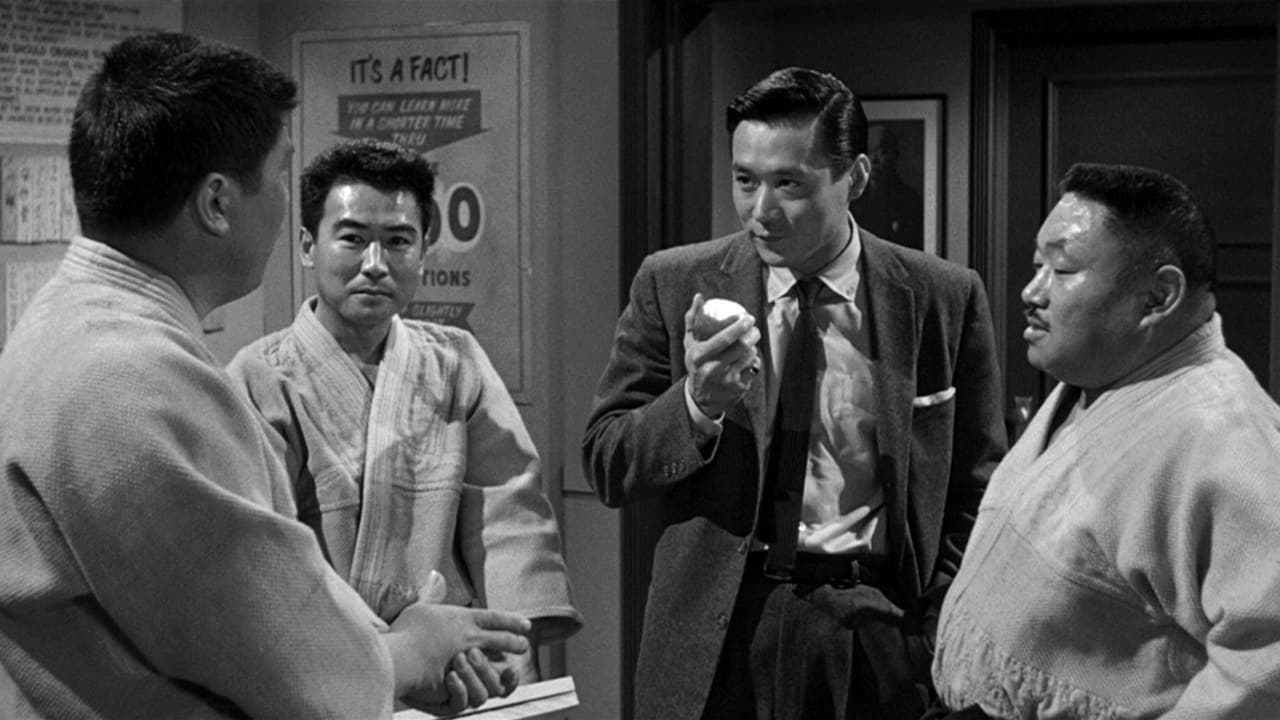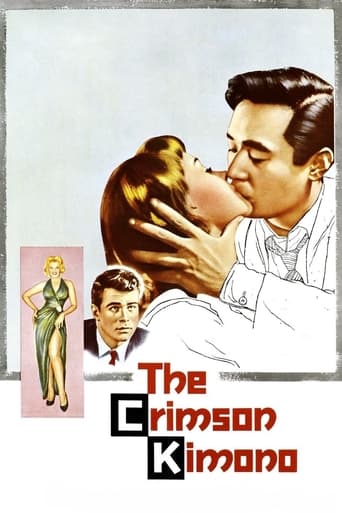

What makes it different from others?
... View MoreBrilliant and touching
... View MoreIn truth, there is barely enough story here to make a film.
... View MoreThrough painfully honest and emotional moments, the movie becomes irresistibly relatable
... View MoreAgainst Hollywood's mainstream value, Samuel Fuller's vintage L.A. murder mystery gallantly sets off a love triangle where a Caucasian woman falls for an Asian man in lieu of the latter's Caucasian friend, but the nisei has his own battle to fight, concerning the congenital racial bias stigmatized Japanese-American in the wake of WWII. Yes, first of all, there is a murder, a burlesque stripper Sugar Torch (Pall) is gunned down on the main street in the Little Tokyo district, and two detectives Joe Kojaku (Shigeta) and Charlie Bancroft (Corbett) are investigating the case, they are Korean war veterans and best friends, even sharing a snug apartment, their police procedural pans out a bit languorously, but Fuller profiles the enclave's ethnographic traits with a wandering eye, while the meat of the story is concerned with a key witness, Christine "Chris" Downes (Shaw), who paints the portrait of Sugar Torch dressed in a crimson kimono for the preparation of a Japanese-themed act (one can only imagine what technicolor would do justice to the chromatic appeal here). When her own life is in peril after drawing an identikit of the possible killer, Joe and Charlie invite Chris to stay in their apartment, naturally both bachelors become besotted with her, but it is the interracial romance gains an upper hand (Joe is the more refined, sensitive and art-savvy one), which leaves Joe clammed up in a state of guilt of betraying his best friend, as he knows Charlie reckons Chris as the girl of his dreams, and when the truth finally comes out, Joe's inborn inferiority complex reaches a boiling point, moreover, let's not forget a heartless killer is still at large (although a whodunit's allure has seismically eclipsed by a torrid love triangle at that stage), and Fuller fabricates an analogous tie-in between the killer and Joe, which rounds off the story adequately during the annal Japanese pageant in the Little Tokyo.A fly in the ointment is that Fuller insensitively shoves the moral ambiguity to Chris, being the one who is courted by both men, she doesn't refuse Charlie's advance in the first place and acquits herself as if she has no qualm of reciprocating Joe's feelings, then, even egregiously acts oblivious of the fact that it is her deeds drive a wedge between them, and isn't it up to her to clear the air? Of course, such action isn't allowed in Fuller's script. Consequently, audience will find more relish in a Bourbon-tippled Anna Lee, whose worldly counsel including "Love does much, but Bourbon does everything!". A Golden Globe-winning Shigeta seizes upon this rare opportunity vested by this groundbreaking treatment of racial minority and the lingering, deleterious fallout of WWII afflicting on the next generation, thus, breaks the glass ceiling as an Asian leading actor, with his palpitating affection and disarming demeanor, in Fuller's off-the-radar metteur en scène.
... View More"The Crimson Kimono" is not one of Sam Fuller's better films, but leave it to Fuller to make a murder mystery thriller where the murder mystery becomes almost beside the point and the film instead becomes an examination of racial tension.That tension doesn't even play a role in the crime at the film's center. It's between the two detectives assigned to solving the murder. And this isn't a whites-being-racist-against-minorities film either. It's the Japanese American detective (played by James Shigeta) who has the problem, seeing racism against himself where it doesn't exist and not able to get past his own insecurities about his heritage. This quality more than anything else makes the film unique and very Fuller-esque, but in all other ways it's a bit of a disappointment. It only has moments of that ragged, off-kilter quality that make Fuller's best movies -- movies like "The Naked Kiss," "Shock Corridor" and "The Big Red One" -- so damn good.Grade: B-
... View MoreThe Crimson Kimono is written, produced and directed by Samuel Fuller. It stars Glenn Corbett, James Shigeta, Victoria Shaw & Anna Lee. Cinematographer is Sam Leavitt and the music is by Harry Sukman. Plot is about two L.A. cops, Joe Kojaku (Shigeta) & Charlie Bancroft (Corbett), deep friends of a different race, bonded by blood who met during the Korean War. When stripper Sugar Torch (Gloria Pall) is shot and killed, the two men's investigation sees them follow a painting to the artist who painted it, Christine Downes (Shaw). It's the start of a love triangle that could have far reaching consequences for not only the investigation, but also Joe, Charlie & Christine.1959 saw the release of Douglas Sirk's Imitation of Life, a much talked about movie, that whilst splitting the critics down the middle, was none the less the fourth biggest earner at the box office that year. Sirk's film, amongst other things, had a racially charged thread in it that gave it some added potency. The Crimson Kimono also had a racially charged thread running thru it, but Samuel Fuller's film, it seems, slipped under the radar. Now of course in the modern era of film, Sam Fuller is often name checked by the likes Scorsese & Tarantino as being an influence, while the French New Wavers were quick to laud him as a stylistic influence too. The Crimson Kimono is far from being Fuller's best work, but it is unmistakably a Fuller movie, and one that is a must see for those of a noir/hard-boiled persuasion.Fuller has managed to put a murder mystery at the core of his film and wrap around it a tale of inter-racial tolerance, jealousy and sexual confusion: set deliciously to the backdrops of an urban part of L.A. and the more cosmopolitan Little Tokyo. As he weaves his vision together, never once hitting the viewer over the head with its messages, Fuller neatly plays around with his camera. Up close and personal to his actors, sweeping alongside for walk sequences and scatter-gun shooting for his action scenes (a Kendo fight is an action high point). It's thoughtful film making, the camera puts us in with the story and no scene is wasted, it's all relative, particularly as tensions start to rise between the two best friends and the case starts to unfold.The principal actors are not big names, but all are very credible, and the lack of star power actually benefits the piece by keeping the narrative grounded. While the supporting Anna Lee (How Green Was My Valley) as an alcoholic mother figure type is a joy to watch. Sam Leavitt's (Anatomy of a Murder/The Defiant Ones) photography has it just right, the black & white has a stark look for the street exteriors and the interior focus has that hue of character importance about it. Harry Sukman's music is also worthy of mentioning, blending jazzy beats with oriental flavors, it's well in keeping with the nature of the story.Although there's no cop out in the finale, in fact it's an important and affecting finish as regards the characters, the murder mystery angle close down is a little unfulfilling in context to the mood that has overall been built up. But it's no deal breaker and doesn't detract from what a very good movie The Crimson Kimono is. 8/10
... View MoreMaybe it's just me, but only a short time into this film I was already wondering just WHO acts like these characters?! For instance, there is a stripper (sugar Torch) who was planning a classy(?) striptease act where she would dress as a Japanese woman in a crimson kimono and two men would fight over her--one with a kitana (Japanese sword) and the other using his bare hands and karate. Another woman is a bohemian painter who talks in a very broad style and throws beer on canvases and seems a bit like Maynard G. Krebs. So, at the onset I was taken out of the moment because the film was trying too hard to be different. While director Sam Fuller's films usually excel at realism, this one just didn't quite make it. It's a shame, as I've loved many of his films and from this point on, it would be hard to sell me on THE CRIMSON KIMONO.The film begins with some maniac chasing Sugar Torch out of the theater after she finishes her act. She is gunned down in the middle of the street AND the killer takes the time to shoot a painting of her in the kimono in the throat that is in the dressing room. Two police detectives, Glenn Corbett and James Shigeta are sent in to investigate this murder in the Japanese section of Los Angeles. Naturally, with the bullet in the painting they think that there is something more to it. It's even MORE so when someone tries to shoot the artist ("Chris") next--though HOW the killer could have missed when he shot at her is beyond me.Now I noticed that some call this movie an example of Film Noir. However, I really didn't see that. Part of this was because the music was heavy on violins and sounded more akin to the soundtrack from PEYTON PLACE, the camera angles and darkness of typical Noir is missing and the characters are just too pretty--particularly the men, Shigeta and Corbett. When I think Noir, I think snappier and grittier dialog and ugly guys like John Ireland, Edmond O'Brien or Broderick Crawford. Plus, there is an interracial love interest that I liked...but it just didn't seem like Noir. Noir is NOT just a cop film but a style and attitude this one lacked--not that it was badly directed or produced. At heart, it's much more of a romance film.As for the interracial love interest, BOTH cops fall for Chris (the woman painter; had it been some other Chris, this might have been REAAAALLLY interesting and daring). And, Chris is feeling very strong feelings towards Shigeta. Eventually, the two men come to blows over this woman during a kendo match. Shigeta is convinced that his partner is a racist, though he seems to be reading something into his partner's (and long-time friend) thoughts and actions. However, Corbett is feeling normal jealousy...and still cares about his friend deeply. And, it turns out that the motivation for the killing early in the film is related, in a way, with Shigeta's struggle.Overall, despite a very rough beginning and it being incorrectly labeled 'Noir', the movie turned out to be pretty good and daring for its interracial love story. Yes, it had been done before in movies such as SAYONARA, but it was still a tough sell in 1959. Well worth seeing.
... View More